
PUBLISHED FOR FRIENDS OF ROGER WILLIAMS PARK ZOO






By Stacey Johnson
Executive Director, RWP Zoo and RI Zoological Society
Every year, we celebrate National Zookeeper Week to honor the dedicated and hardworking individuals who care for animals in zoos and aquariums. This special week is an opportunity to recognize the valuable contributions of zookeepers in education, conservation, and animal care. At Roger Williams Park Zoo, we are excited to join the celebration and share stories of our incredible care team during National Zookeeper Week.
National Zookeeper Week shines a spotlight on the essential role zookeepers play in maintaining the well-being of animals under their care, wildlife conservation, and public education. Being a zookeeper is tough! It’s a career full of long hours and often physically and emotionally exhausting work. And I know that from personal experience, as I got my start in the zoo world as a zookeeper.
When I began work in this field, it was a time of active transition for zoo employees who worked directly in animal care. For decades, their role had been defined by the task that consumed most of the time in their work day: cleaning! The best zookeepers also managed to incorporate animal behavior management to provide an environment rich in stimuli that encouraged animals to use their physical and psychological adaptations and to expand their scientific understanding of the natural world. However, not until the mid-1980s, into the 1990s, did those aspects of zookeeping shift away from special interest activities – often completed on their own time - to what was expected as part of the job. Today’s zookeepers most often join the workforce with formal training and education and some preparatory experience gained as interns or volunteers. It is a job that requires keen observational ability, a high level of critical thinking, loads of creativity, a fair amount of physical endurance and plenty of emotional strength.
These days, television glamorizes the adventure, the passion, the highs and, yes, the lows of life as a zookeeper. It is a pleasure to see their work gaining attention! One thing it cannot capture is the time, patience and perseverance required to be a professional zookeeper. As one of my mentors once said about a colleague receiving special recognition, “He is an overnight success…after 30 years!”
National Zookeeper Week is a time to celebrate the passion, commitment, and skill zookeepers bring to their vital roles. From caring for animals to inspiring guests through education, zookeepers play a key role in building meaningful connections between people and wildlife.
As a final note, the actual zookeepers are thirty members of a Roger Williams Park Zoo team made up of about 150 employees. Zoo guests, media and even government officials often – happily – refer to all of us as zookeepers. So, in addition to the keepers, please join me in applauding everyone who works hard each day to achieve the Zoo’s mission!
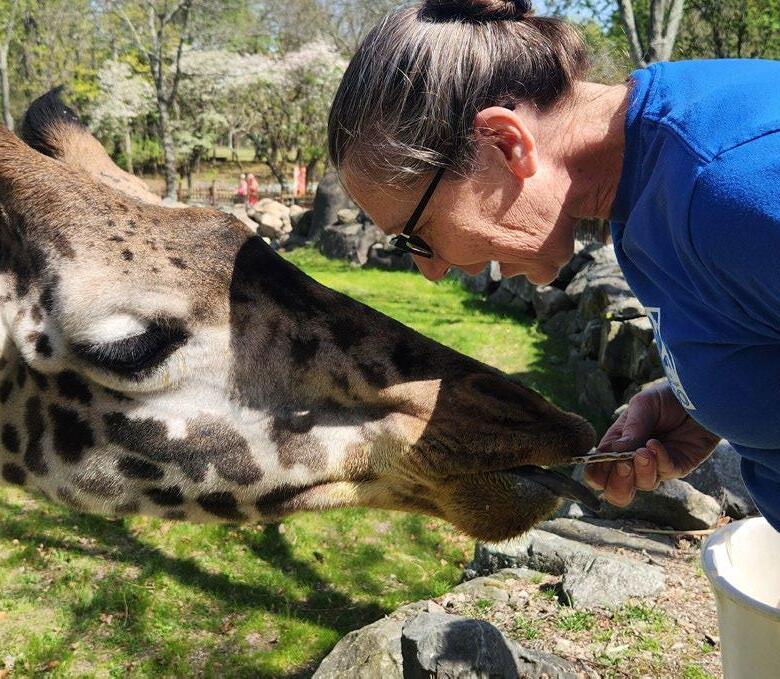
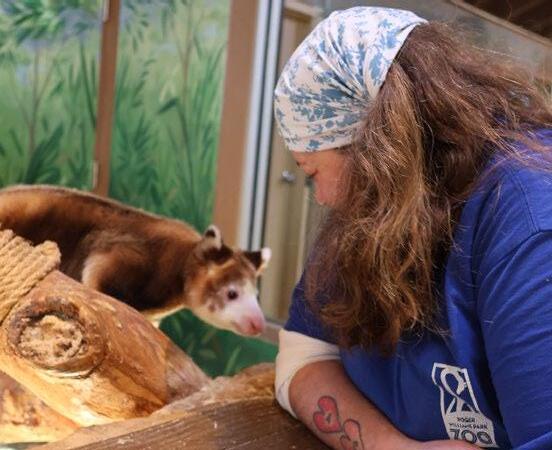


Every July, we celebrate World Zookeeper Week to honor the hardworking people who dedicate their lives to caring for animals in zoos and aquariums. Zookeepers play a vital role in animal welfare, conservation, and education - but did you know their work can also be physically and emotionally demanding? This year, we are taking a closer look at what zookeepers do, and why caring for their mental health is just as important as the care they give to animals.
• Feeding animals and making sure they have balanced, nutritious diets
• Cleaning and maintaining habitats to keep them safe and comfortable
• Observing animal behavior to monitor health and well-being
• Training animals for medical check-ups and enrichment
• Educating the public about wildlife conservation Zookeepers often develop deep bonds with the animals they care for. Whether training an armadillo to receive an ultrasound or preparing cool treats for river otters, their dedication is full of love and patience. These deep bonds can bring heartbreak and grief when they experience animal loss. While working with animals is rewarding, it also comes with emotional challenges. Zookeepers may experience stress from physically demanding work,
long hours, and unpredictable situations.

They also often experience compassion fatigue, a form of emotional burnout common in caregiving professions.
Public misunderstanding of the zookeeping profession, among those who may not fully understand the role of modern, accredited zoos in conservation, can also be disheartening. Zookeepers give their blood, sweat, and tears to this role to ensure their animals are healthy and thriving. They are not just Zookeepers, but highly trained professionals, trainers, researchers, compassionate caregivers, and so much more!
Healthy zookeepers mean healthy animals. When zookeepers feel supported, they can give their best to the animals in their care and continue sharing their knowledge with the public. Their passion fuels conservation efforts that protect species across the globe.
So, this World Zookeeper Week, we encourage you to thank a zookeeper during your next visit. Whether with a kind word, a handwritten note, or simply by learning more about their work. Behind every happy animal you see at the Zoo is a keeper who’s working hard, heart and soul.
To all the zookeepers out there: THANK YOU! Your care makes a world of difference!
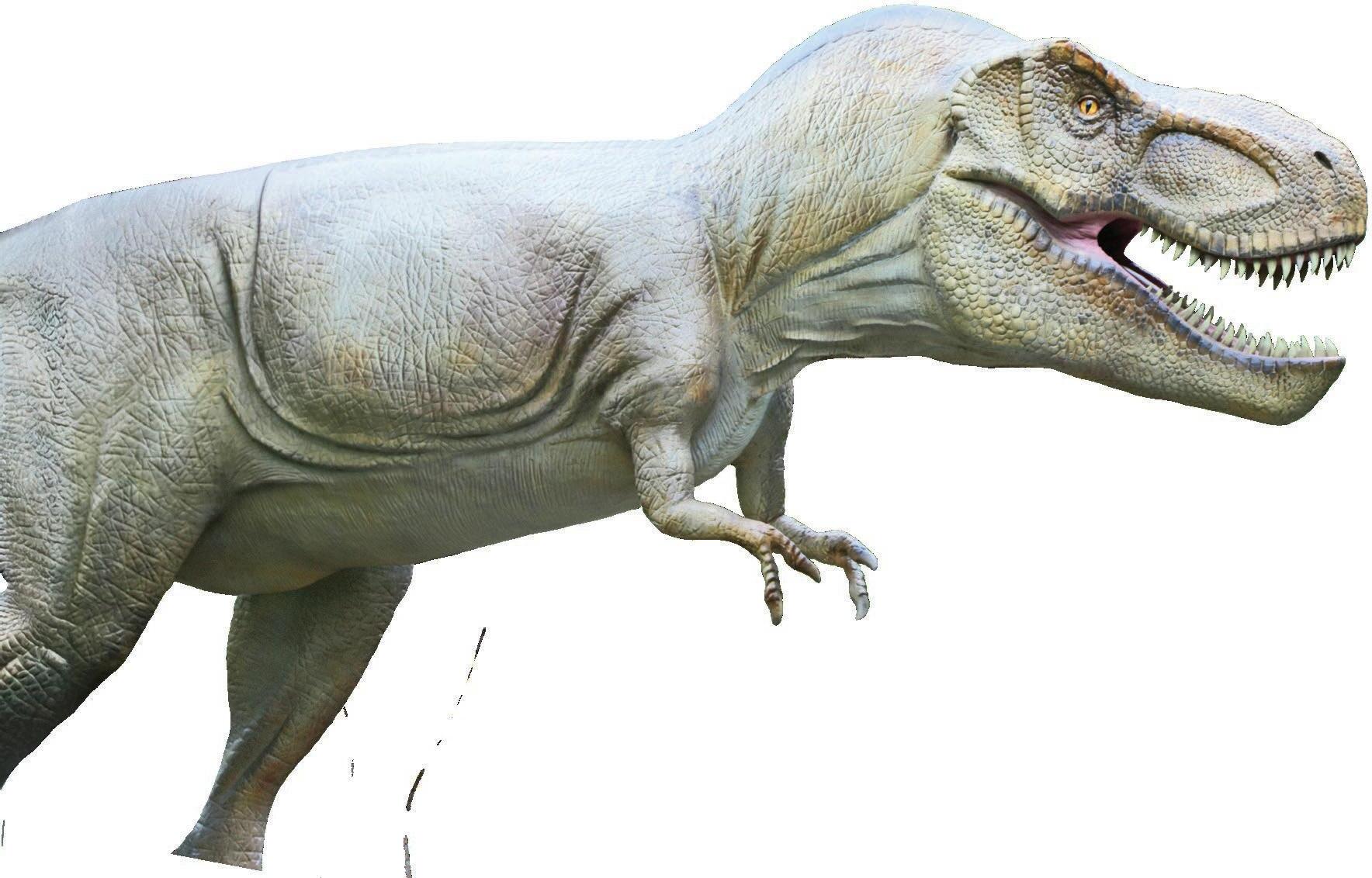
ROGER WILLIAMS PARK ZOO presents
NOW THROUGH AUGUST 10, 2025

make suRe to visit make suRe to visit
RetuRn of the Dinosaurs before they go extinct again
after august 10th!
You can follow in the footsteps of Zoo staff who have scouted ahead to uncover the secrets of these fascinating creatures. Discover how scientific understanding of dinosaurs has evolved over time—from groundbreaking research in paleontology to their enduring legacy in popular culture. Whether you’re a lifelong dinosaur enthusiast or a curious adventurer, Return of the Dinosaurs offers an unforgettable, immersive experience for guests of all ages.
Get ready for an adventure where history’s most awe-inspiring creatures are just a step away! Danger, discovery, and dinosaurs await at Roger Williams Park Zoo’s Return of the Dinosaurs!



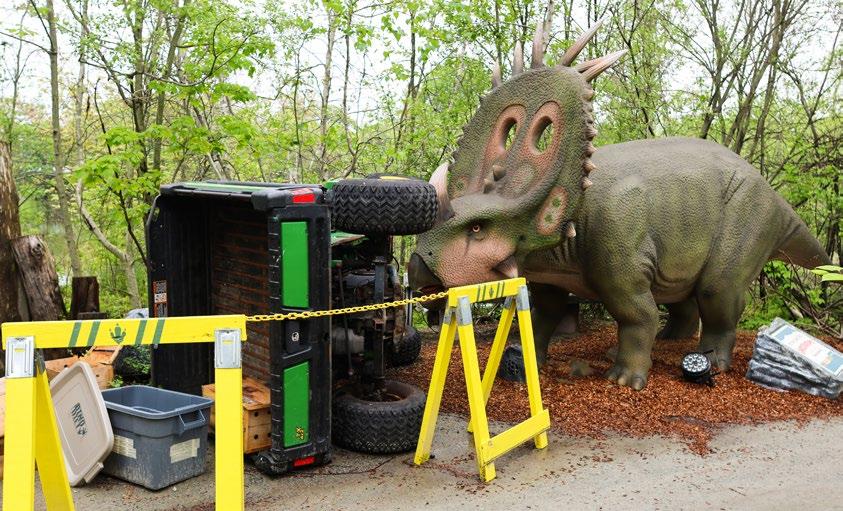

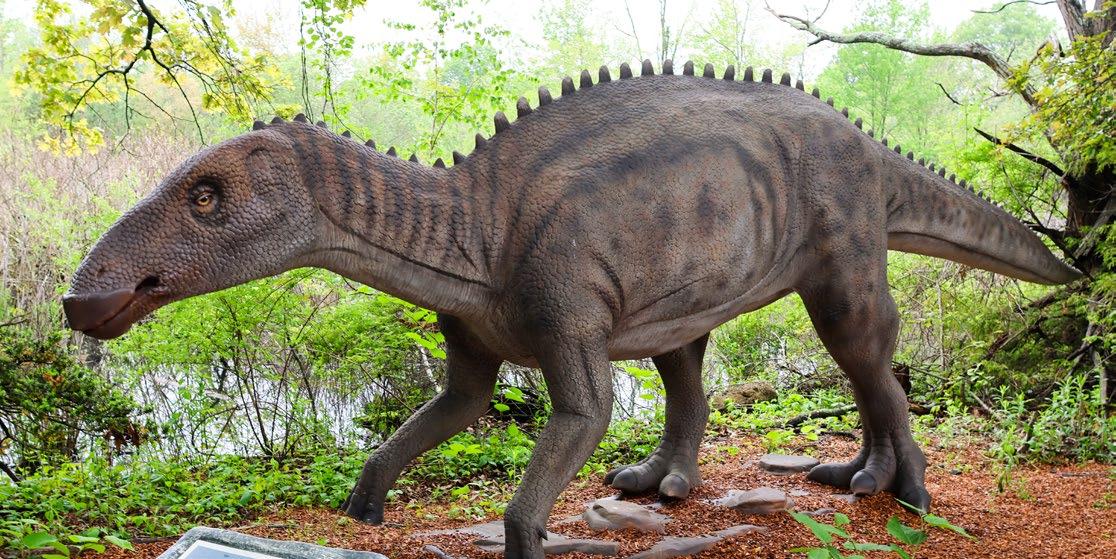

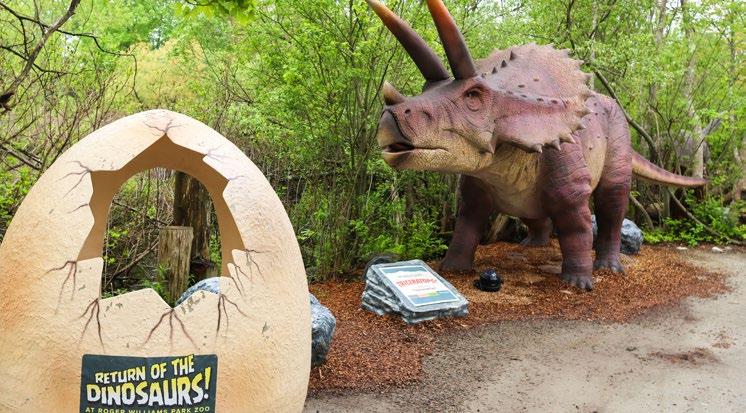

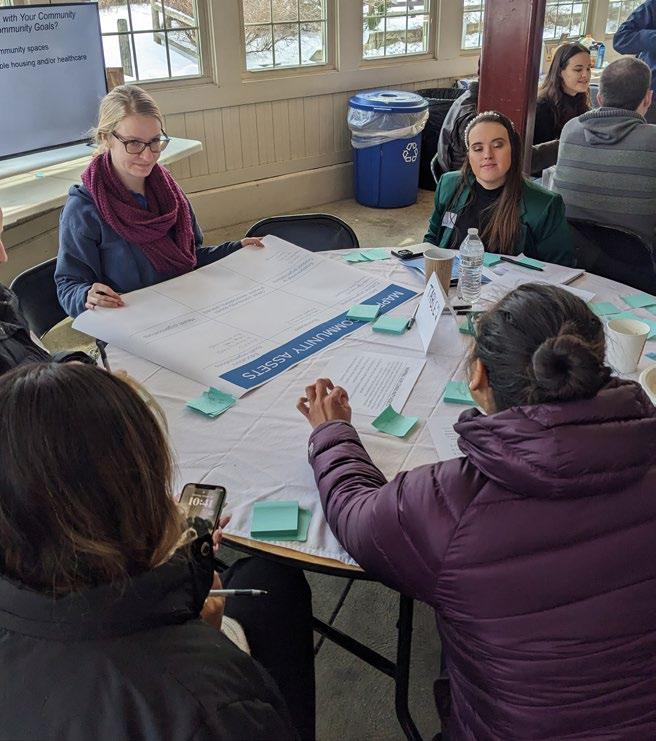
At Roger Williams Park Zoo, we know the greatest threats to wildlife, climate change, habitat loss, and pollution are caused by people. It makes sense that people must be at the heart of the solution.
That’s the idea behind Co-Designing Conservation, a community-driven project we launched with Antioch University in 2021. Rather than assuming what our neighbors want or need, we asked: What matters to you? And how can the Zoo help?
Through listening sessions, surveys, and community events across Providence, we heard about concerns like air quality, safety, representation, and access to green spaces. These may not sound like zoo issues, but they’re deeply connected to conservation. After all, if people don’t feel safe or included, how can they care for the planet?
With community members and local service providers, we co-created new programs that reflect shared priorities. One result: a reimagined Earth Agents program, where youth and adult participants led projects on pollinator education, endangered species, and youth engagement in public libraries. As one participant said, “I felt like a leader…I felt like a teacher, and I loved it.”
We also brought the Zoo to the people, with programs in Providence Parks meeting families where they are. More than 1,200 residents have taken part so far.
Conservation doesn’t stop at the Zoo gates. It begins with people, and it belongs to everyone. And when we listen and work together, we’re not just protecting animals but creating a future where both people and wildlife can thrive.

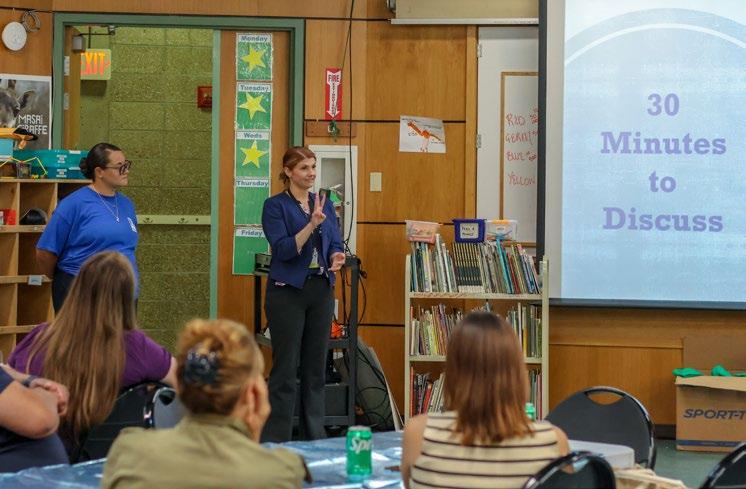



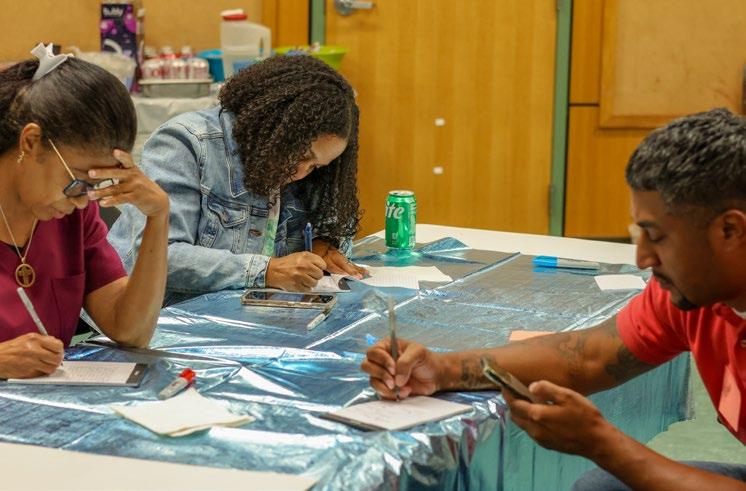
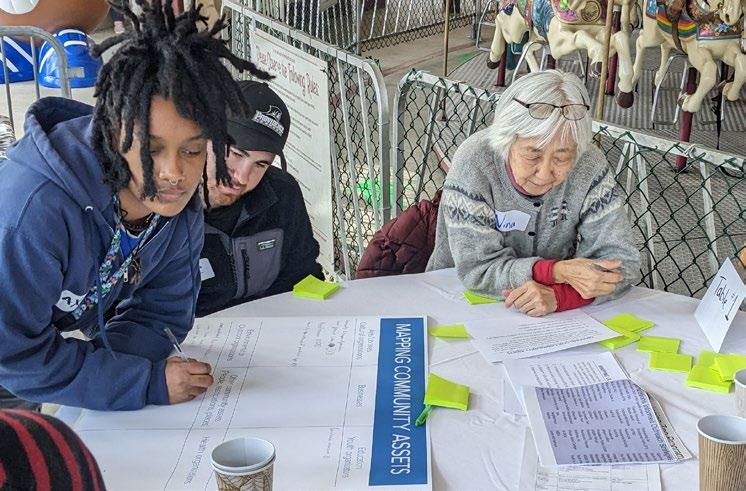
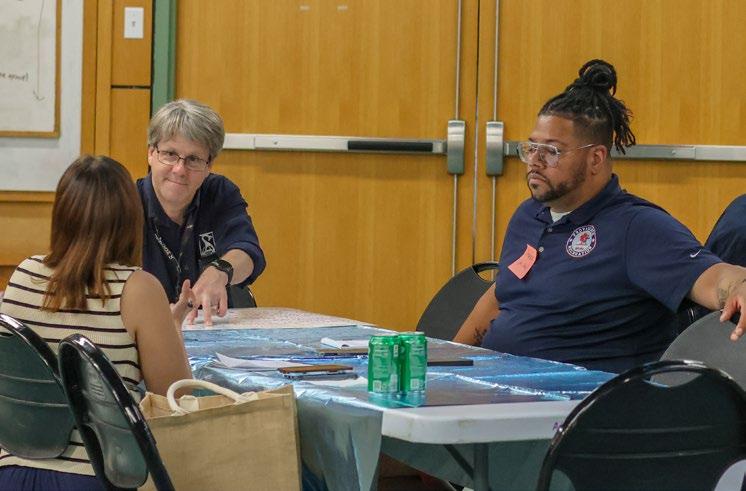



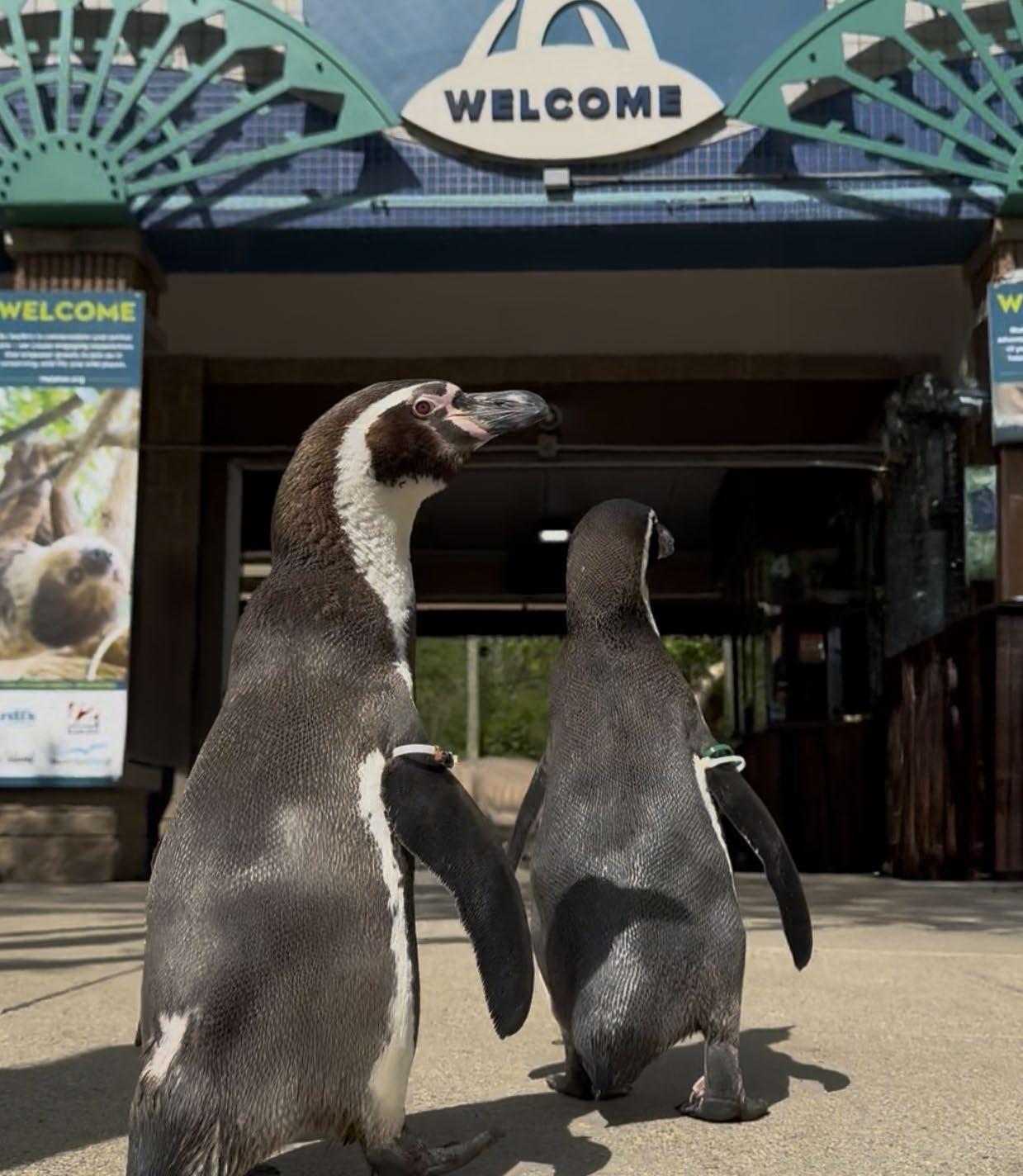

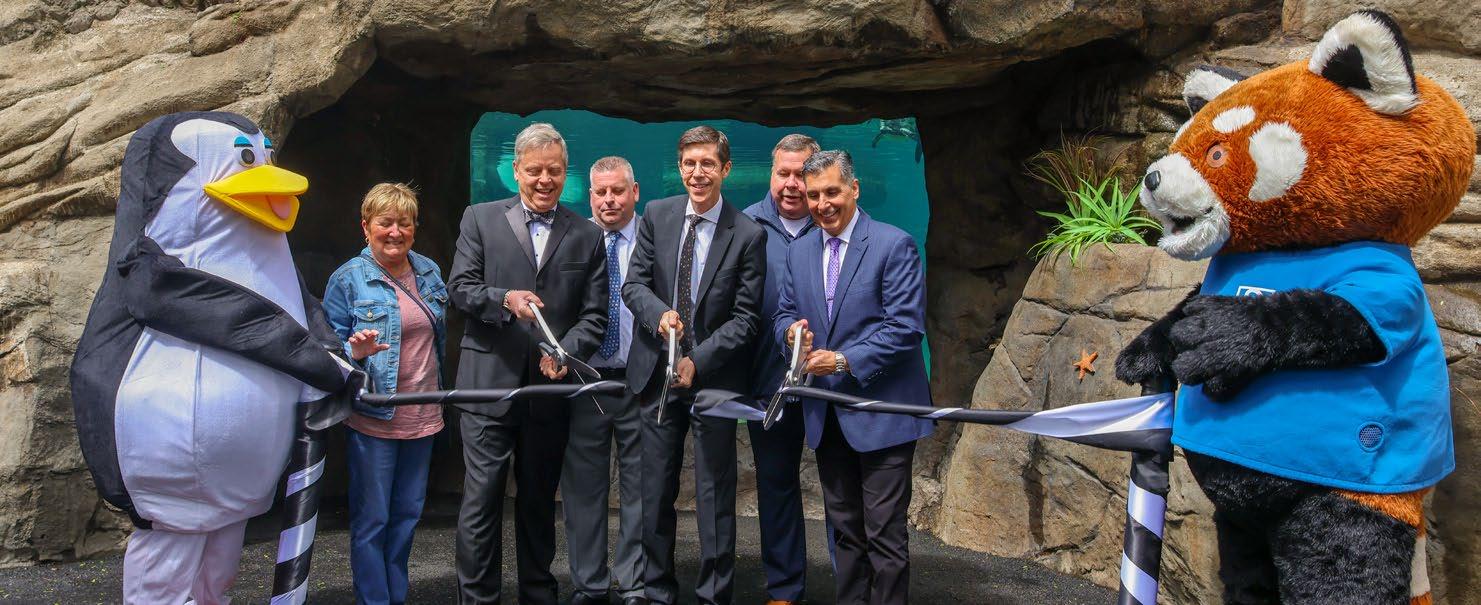
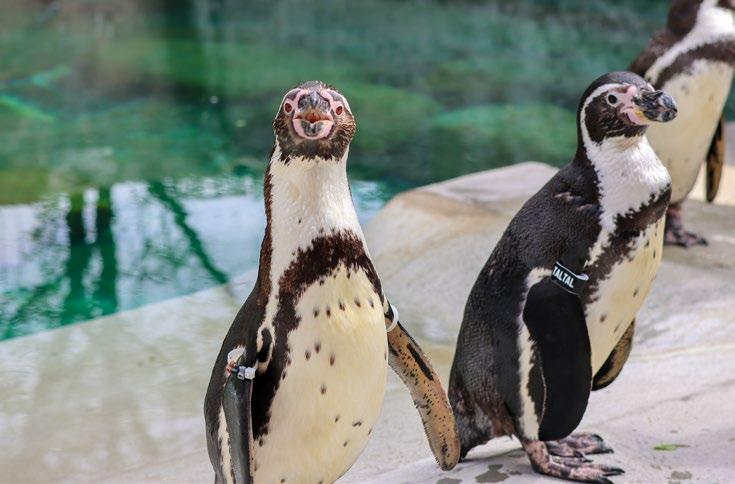
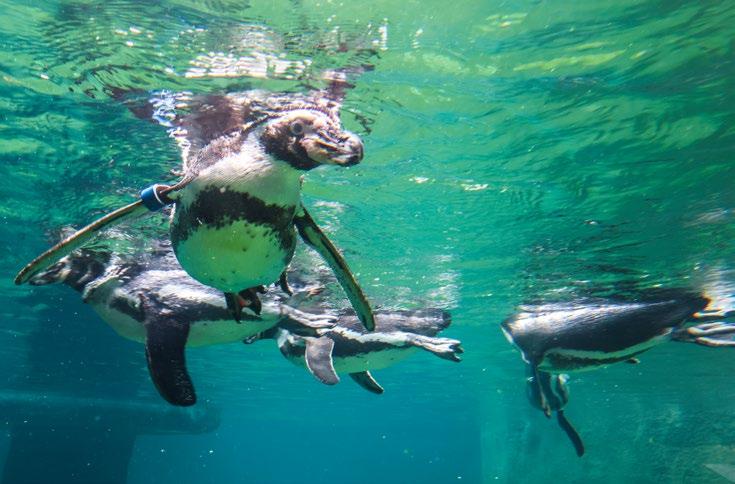
Most people imagine snow and ice when they think of penguins, but our Humboldt penguins are from the hot, arid coastal regions of Chile and Peru. Humboldt penguins inhabit these coastal regions, favoring rocky environments near nutrient-dense waters.
Humboldt penguins stand 15-18 inches tall and weigh about 9 pounds. Their waterproof, insulating feathers are maintained by constant preening with oil from their preen gland. These marine birds consume a diet of fish, squid, and crustaceans.
Start planning your summer adventure today at rwpzoo.org


Have you heard of a snake that shines like a rainbow in the sun? Meet the rainbow boa!
We’re spotlighting this dazzling reptile in honor of World Snake Day (July 16).
“They don’t look like a rainbow… why are they called ‛rainbow’ boas?”
The rainbow boa gets its name from its iridescent scales. When light hits them just right, these snakes shimmer with rainbow-like colors! It’s not magic, it’s science! Tiny ridges on their scales reflect light in a way that creates a rainbow effect, like a bubble or an oil slick.
Rainbow boas are native to Central and South America, especially in rainforests near rivers and swamps. They love warm, humid places where they can slither through the trees or soak in shallow water.



These snakes are constrictors, which means they don’t use venom. Instead, they gently grab their prey with their teeth and wrap around it to give a tight squeeze. Their diet includes rodents, birds, lizards, and frogs.
Snakes like the rainbow boa play an important role in their ecosystems by helping control pest populations and serving as food for larger predators. Every snake has its place in nature’s web, and World Snake Day is the perfect time to learn, appreciate, and protect these often misunderstood creatures.
So, give a hiss of appreciation for the rainbow boa, and all the other amazing snakes slithering around our planet. Happy World Snake Day!
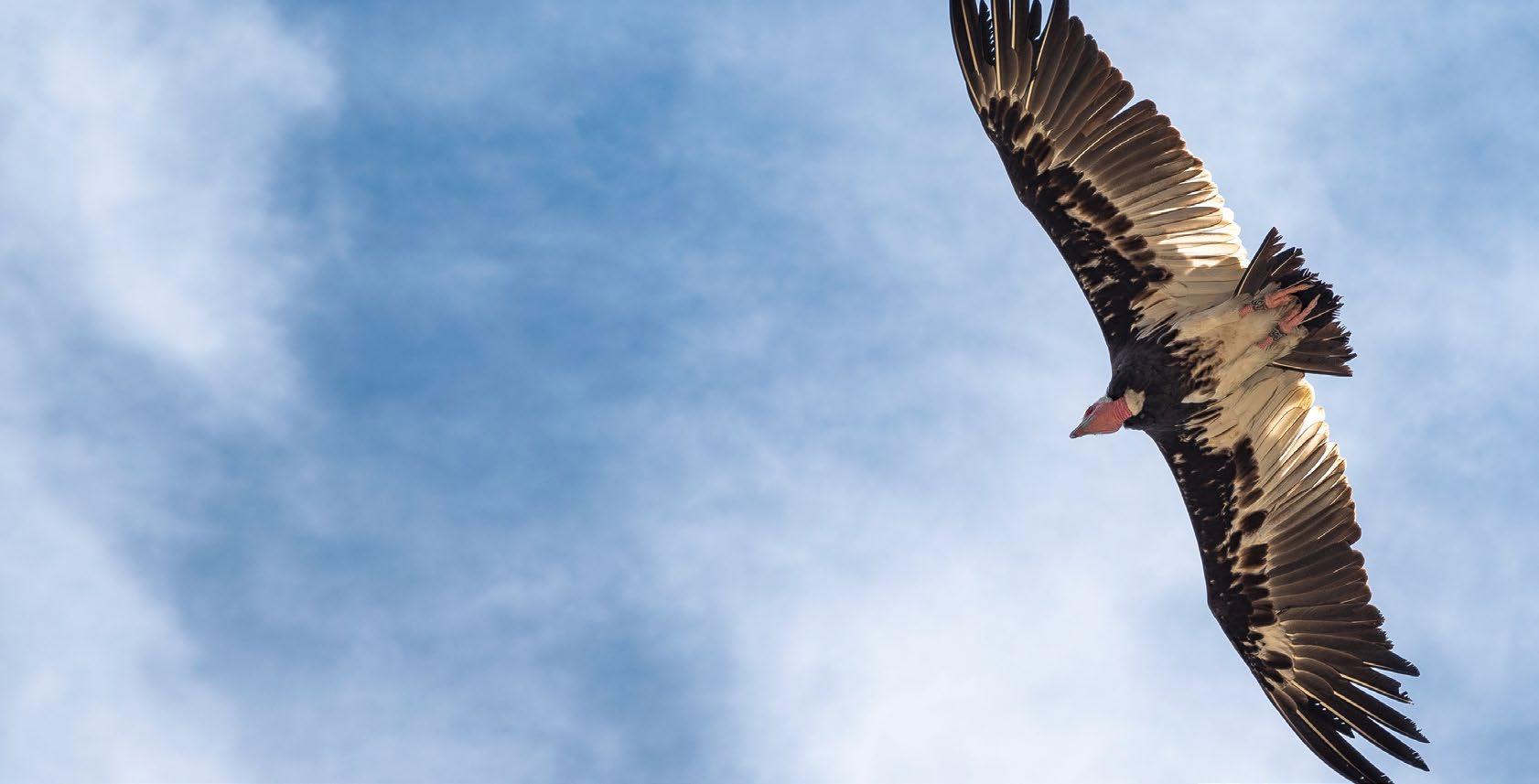
Saturday, September 6, 2025, is a day to celebrate some of nature’s most misunderstood yet incredibly vital animals: vultures! Here at the Zoo, we’re joining hundreds of organizations worldwide to shine a much-needed spotlight on these remarkable birds for International Vulture Awareness Day (IVAD).
Beneath each vulture’s unique appearance lies a true ecological superhero, playing an indispensable role in keeping our natural world healthy and balanced. They specialize in consuming dead animal remains, also known as carrion. This might sound a bit gross, but it’s crucial for maintaining a healthy ecosystem!
Imagine a world without vultures. Carcasses would pile up, becoming breeding grounds for harmful bacteria and viruses. Vultures swoop in and efficiently consume dead animals and organic waste. By doing so, they act as natural disease preventers, reducing the spread of diseases that could devastate wildlife, livestock, and even human health.
One of the most amazing things about vultures is their incredible digestive system. Their stomachs contain powerful stomach acid, which allows them to safely feed
on animal carcasses and remove harmful bacteria and viruses from the environment. This unique adaptation means they can consume carrion without succumbing to the very pathogens they are helping to remove from the environment.
Did you know there are 23 different species of vultures found across the globe, with species found on every continent except Australia and Antarctica? Despite their critical importance, vultures worldwide are facing a dire crisis. Approximately 70% of all vulture species are classified as Vulnerable, Endangered, or Critically Endangered.
The threats they face are often human-induced, direct and indirect poisoning, often from pesticides or lead ammunition in carcasses. Illegal killing and habitat loss, along with electrocutions or collisions with power lines, pose significant dangers.
That’s why International Vulture Awareness Day is so important. It’s an opportunity to dispel the myths and misconceptions surrounding these birds, celebrate their incredible adaptations, and, most importantly, inspire meaningful conservation action before it’s too late.


Here at the Zoo, we’re proud to be home to two magnificent King Vultures, Nubs and Goofy. These stunning birds are excellent ambassadors for their species.
Rhode Island is home to two species of vultures: the turkey vulture and the black vulture. Both species are exceptional scavengers, keeping our roadsides clean and our local ecosystems healthy.
• Turkey Vulture: This is the more commonly seen vulture in our state. You can often spot them gliding gracefully, using their incredible sense of smell to locate carrion.
• Black Vulture: While less common, the Black Vulture can also be found in Rhode Island. They tend to have a shorter tail and a more direct, flapping flight pattern.
While our local vultures are doing their part, they face a significant threat right here in Rhode Island: rodenticides. When mice and rats consume these poisons, they become toxic meals for any animal that preys on them. Unfortunately, vultures (along with owls, hawks, and eagles) can unknowingly consume these poisoned rodents, leading to illness or even death. Our local vultures are an incredibly important part of Rhode Island’s ecosystem, and it is up to us to protect and conserve these birds.
• A group of vultures on the ground or in a tree is called a committee or a volt. If you see them soaring together in the sky, it’s called a kettle!
• Size: With an impressive wingspan of over 6.5 ft and weighing between 6-10 lbs., King Vultures are quite large.
• Habitat & Range: You can find King Vultures in the tropical lowland forests, ranging from southern Mexico all the way down to northern Argentina.
• Threats & Conservation: Like many vulture species, King Vultures face threats from habitat loss due to deforestation and illegal hunting.

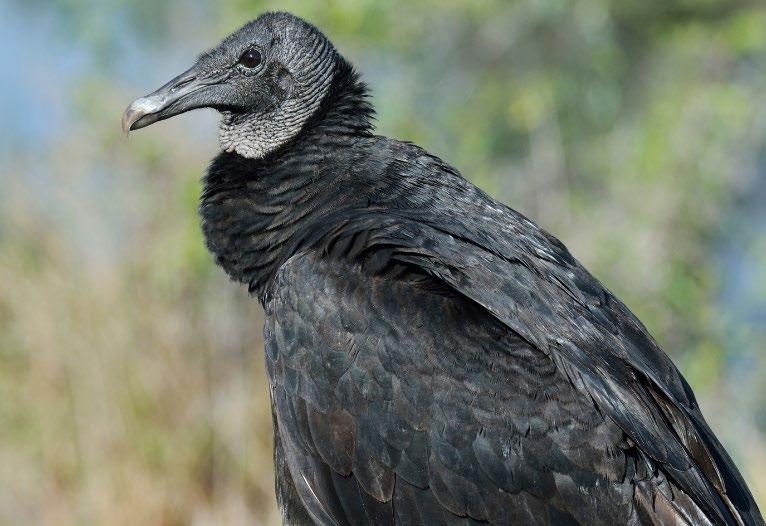
• If a vulture feels threatened, it might vomit! This is a clever defense strategy. By expelling their stomach contents, they lighten their body weight, allowing for a quicker, more agile escape from predators.
• Ever wondered why vultures have featherless heads? This unique adaptation helps them stay clean when feeding on carcasses. Lacking feathers in this area prevents carrion bacteria from getting stuck in their feathers.
A massive round of applause for the talented winners of our 2025 Endangered Species Youth Art Contest! With hundreds of entries, these young artists truly showcased incredible creativity and a deep commitment to safeguarding endangered species.
Don’t miss the chance to experience these inspiring masterpieces yourself, now on exhibit at the Zoo’s Big Backyard building! Each piece is a powerful reminder of why we must protect these creatures and their wild homes.

A big shoutout to all who participated and our fantastic supporting partner, Jerry’s Artarama of Providence! Your passion is helping to inspire the next generation of conservationists, raise vital awareness, and encourage action for our planet’s precious wildlife. Special thank you to supporting partner:

9-12


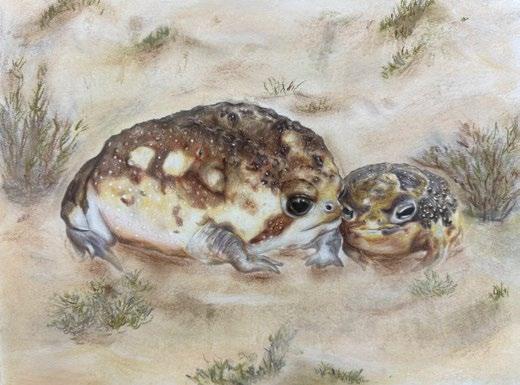

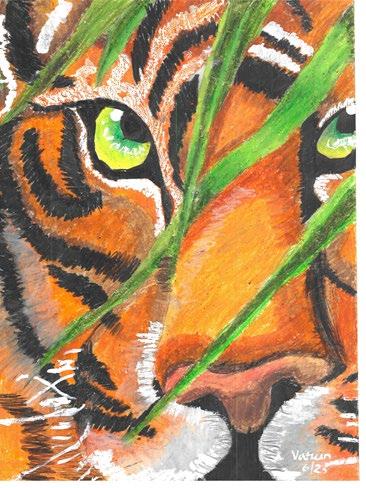
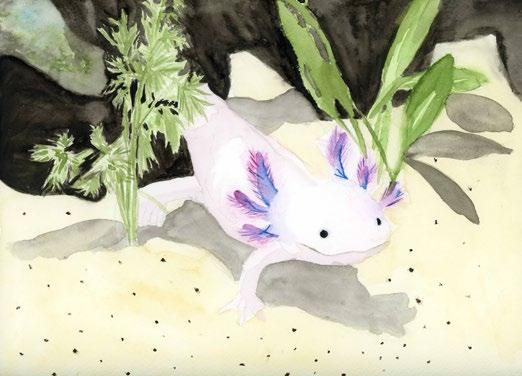




40 & Fabulous- Happy Birthday to Ginny, Kate and Alice!
July 12th (rain date July 13th)
Our beloved elephants are turning 40, and you’re invited to the party! Come celebrate this milestone with birthday treats, kids’ activities, enrichment activities, and fun for the whole family. Meet the girls, learn about elephant conservation, and help us make their big day unforgettable! Free with admission.


Saturday, July 19th
Get ready for a fantastic evening of entertainment featuring Ace DJ Entertainment, Queer-e-oke, and drag performances. Discover fascinating “Nature is Queer” animal chats, zoo-themed cocktails at pop-up cash bars, and connect with local LGBTQIA+ allied organizations.
rwpzoo.org/event/party-with-pride


Saturday August 9th
Journey back in time and enjoy an evening at the Zoo from 5-9 pm. Your ticket includes access to the entire Zoo and the Return of the Dinosaurs walk-through experience.
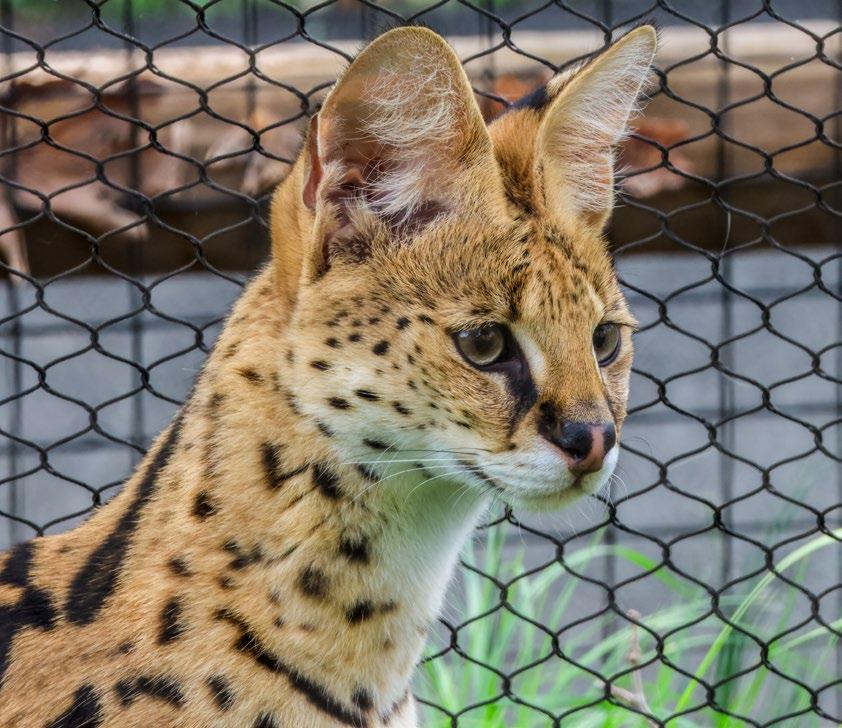
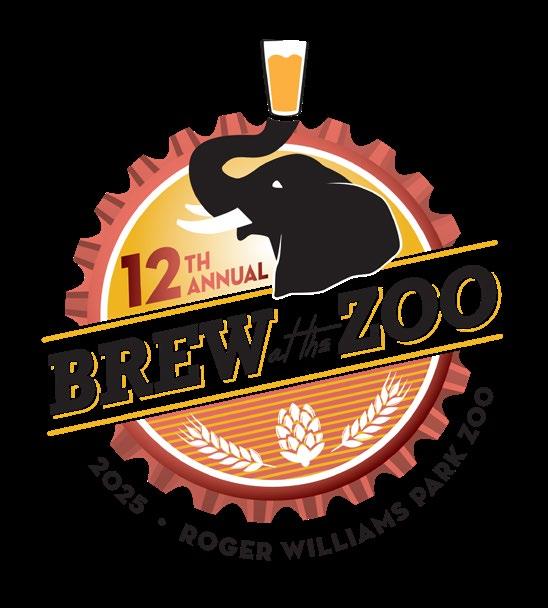
Saturday, August 23
Tap into your wild side! Sample hundreds of beers, hard seltzers, and ready-to-drink cocktails from dozens of local, regional and national breweries. Enjoy live musical entertainment, animal encounters, and more at Rhode Island’s largest outdoor beer festival.

Say hello to Zephyr, our new male serval!
This handsome 14-month-old serval came to us from Greensboro Science Center, an AZA facility in North Carolina as a breeding recommendation for our female, Velma.
Named after Zephyros, the Greek god of the West Wind, Zephyr was born on the first day of spring and brings all the fresh energy that comes with it!
We’re thrilled to welcome Zephyr to his new home and are excited for what the future may hold for him and Velma!

Pamela W. He ernan Co-Chair
Judy Lockard
Beth Mattera
Damaris Messina
John H. Mullen
Jack Murray
Ron Patalano
Zachary Remson
Sara Slahetka
Tempie Thompson
Lauren Ustaszewski
Eric Weiner
unique educational experience where guests can improve their significantly to the conservation of our earth’s animals, plants audience to act as responsible environmental stewards.
Island Zoological Society and is owned by the City of Providence.
Society/Roger Williams Park Zoo Providence, RI 02907

Saturday, June 29, 2024






S

David & Kelsey Coletta
Accu-Care Supply
Nancy J. Allen
The Angell Pension Group, Inc
Bally's Twin River Lincoln
Roxanne Beretta -
Realtor RE/MAX
Bill Lizotte Architectural
Glass & Aluminum
Martha Bower
The Bradfords
Claire Carrabba
Jessica & Peter Chaffee
Club Pilates East Greenwich & Johnston
Deal Electric LLC
Eastern Ice

Felice Farber & Steven Kaufman
Ferestien Feed & Farm Supply, Inc.
Meg Ferguson
Jennifer Foster
General Environmental Services

Gilbane Building Company
The Ken Beck Companies
KPMG LLP
Lahlaf Geotechnical Consulting, Inc.
Liberty Cedar, Inc.
Narragansett Brewing Company
Stephen & Melanie Nedder
North-Eastern Tree Service, Inc.
Pier Fish Company
Karen & Stephen Prest
plants

The Rayta’s
R.I. Container Products, Inc.
SDS Disposal, Inc.
Signature Printing
Spirol
Elizabeth Taylor & Cassandra Puerini
Michelle Viveiros
David & Jill Wolff
Woodlawn Gardens
Thank you for supporting Zoobilee - Party With A Purpose!

A special thank you to our sponsors, volunteers, and guests for making the 33rd annual Zoobilee Party With a Purpose on June 28th such a success – over $245,000 was raised to support the Zoo’s unique education and conservation efforts!
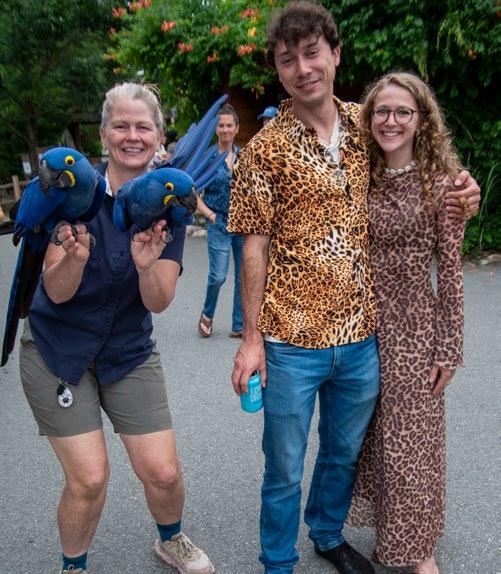
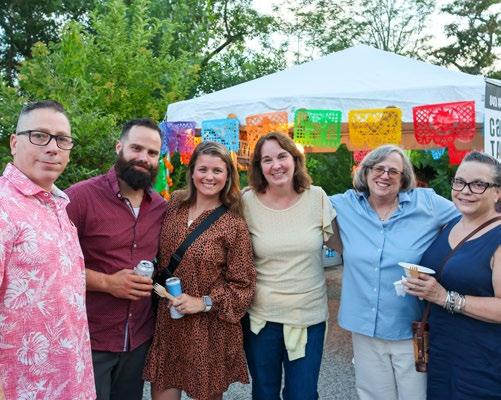
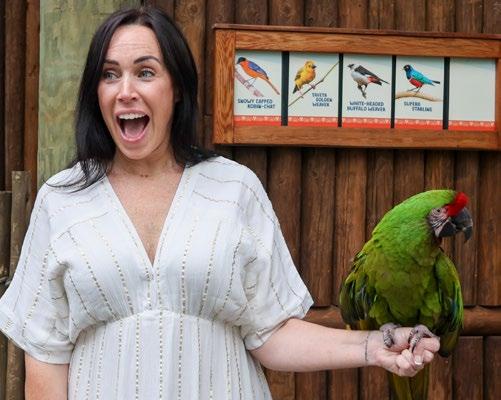
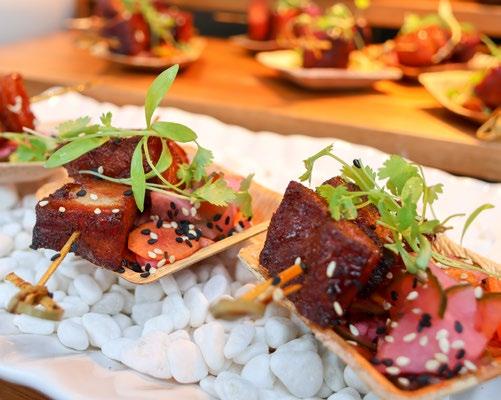
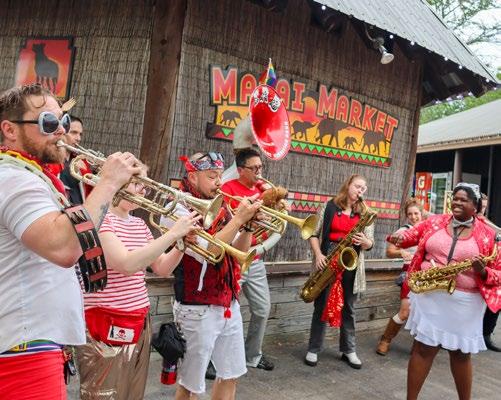

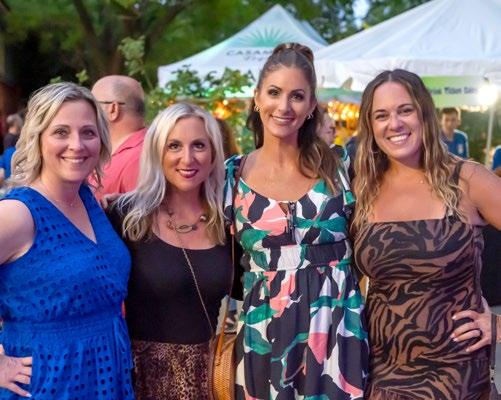

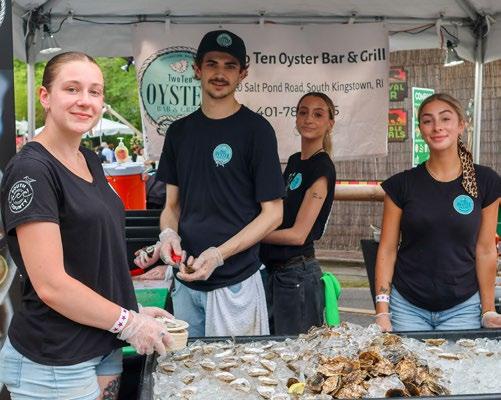




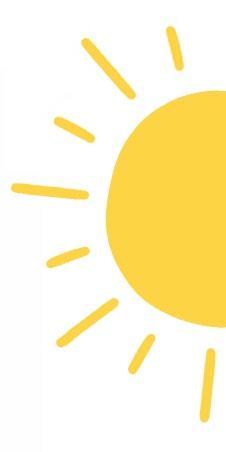









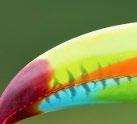
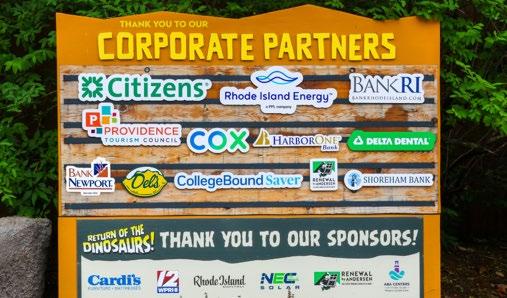
Roger Williams Park Zoo is grateful to have the support of a wide range of sponsors who share our commitment to wildlife, conservation, and community engagement. Their generous contributions allow us to open new habitats, create events and educational programs, put on our fall and winter Spectaculars, and support our conservation initiatives. Thanks to these valued partners, we are able to reach more families, foster hands-on learning, and inspire the next generation of conservationists and environmentalists. We are truly thankful for their involvement and proud to recognize the vital role they play in helping the Zoo serve our community every year.
Jack-O-lantern Spectacular presented by Citizens
Providence Tourism Council sponsor
Holiday lights Spectacular presented by RI Energy
Bank RI presents Zoobilee and Connection Corner
Cox Conserves presents ZooCamp
HarborOne Bank supports Snore & Roar overnight programs
Delta Dental Tooth Time Sponsor
Bank Newport Farmstand sponsor
Santa visits
Dels preferred beverage provider
College Bound Saver Membership sponsor
Renewal by Andersen multi-event sponsor
Shoreham Bank multi-event sponsor
Become a corporate sponsor of the Roger Williams Park Zoo and showcase your brand and organization to our over 800,000 visitors. Let us work with you to find the perfect corporate partnership package for your organizational goals and further the Zoo’s mission of saving wildlife and wild places. Thank you for supporting the Zoo
If you are interested in learning more about sponsorship and becoming a partner, reach out to Judy Lockard, Corporate Sponsorship and Foundation Relations Manager 401785-3510 ext. 318.
Visit our website at rwpzoo.org/visit/corporate-sponsorship/


Roger Williams Park Zoo is supported and managed by the Rhode Island Zoological Society and is owned by the City of Providence
Editorial
Roger Williams Park Zoo Department of Marketing and Public Relations
Corrie Ignagni
Vicki Scharfberg
Maxine Colvin
Designer
WILD is an online publication of the Rhode Island Zoological Society, Roger Williams Park Zoo, 1000 Elmwood Avenue, Providence, Rhode Island 02907-3659
For membership information call (401) 785-3510 x375 or visit rwpzoo.org.
2025 RHODE ISLAND ZOOLOGICAL SOCIETY BOARD OF TRUSTEES
Officers
Patrick T. LeBeau, CFP,® Chair
Sandra L. Coletta, Vice Chair
Margaret Ferguson, Secretary
Maribeth Q. Williamson, Treasurer
Board of Trustees
Nancy Allen
Martha Bower
Douglas Caniglia
Claire Carrabba, Esq
Cheryl Cohen
Sarah Denby
Samir Dhamija
Cindy Erickson
Pamela W. Heffernan
John Igliozzi, Esq
Howard Merten, Esq
Damaris Messina
John H. Mullen
Jack Murray
Steven M. Parente
Karen Silva EdD, CHE
Dameian Slocum, Ed.D.
Ex-Officio
Stacey Johnson
Executive Director
Rhode Island Zoological Society/
Roger Williams Park Zoo
Wendy Nilsson
Superintendent of Parks
Providence Parks Department
Chair Emerita
Sophie F. Danforth*
Trustees Emeriti
Margaret E. Curran, Esq.
Thomas P. Dimeo*
Jocelin Hamblett
James S. Harper III, VMD*
Bradford B. Kopp
Arthur D. Little
Liz Rollins Mauran
Nancy G.R. Moger
Richard Nadeau
Jane S. Nelson
John J. Palumbo
Cate M. Roberts
Philip A. Segal, Jr.
Robert F. Stoico
*deceased

Please follow us online and share your photos and stories!



